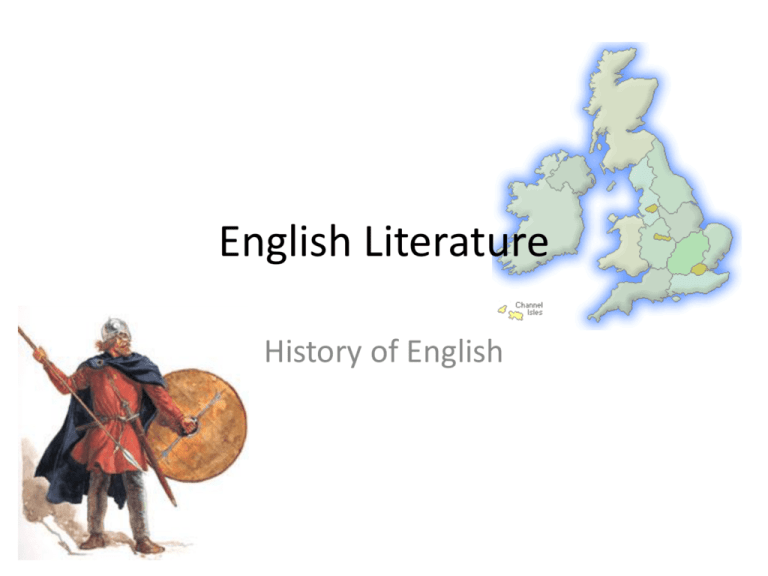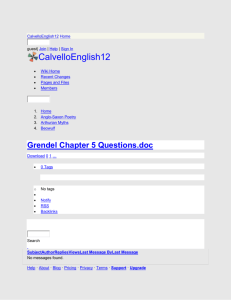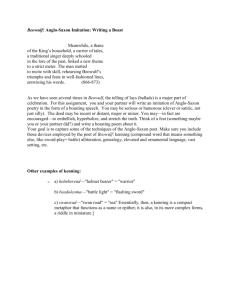English Literature Middle Ages
advertisement

English Literature History of English Britannia Different Celtic tribes lived in Briton (Britanny). (517 BC) Language was called Brythonic (Celtic) Britons: Celtic tribes (before Roman invasion) Britains: Mix of Britons, Angles, Saxons and Norse (after Romans left) Roman Empire The Early Middle Ages (450-1066) Great Britain part of the Roman Empire (55 BC 450 AD) Roman influence Latin names: plants, animals, food, drink, household items: win (wine), candel (candle), catte (cat). Hadrian Wall: to protect Britain from tribes in the north Roman roads Town Names: Manchester (OE ceaster /Lat castrum/ camp) Early Middle Ages Romans left GB to defend the mainland Britain was attacked by: Angles(Denmark) Saxons (Denmark) Jutes (North Germany) Frisians (the Netherlands) Celts were driven off to Wales, Ireland and Scotland Middle Ages After the Anglo-Saxons had settled, Vikings (from Scandinavia) invaded England 787 AD – +/- 1000 AD Danish controlled most of eastern England. Danelaw: area of England that was under Danish law. Consequences 1)Settlements with Danish names in England - by = farm/town (Derby, Naseby) - thorp = village (Linthorpe, althorp) 2)Increase in personal names of Scandinavian origin 3)General words entered the language 4)Personal pronoun system was affected : they, them, their 5) ON verb to be instead of sindon 6) 3rd person singular –s 1066 Battle of Hastings 1066 Battle of Hastings: William the Conquerer (Normandy) seized the English throne Consequences: English language heavily influenced by French language of court, monastries, merchants who crossed the channel. Origin of English Germanic invaders called Celts wealas (Welsh) Celts called invaders Saxons (all of them) End of 6th century term Angli. Aethelbert (601 AD) is called rex Anglorum (King of the Angles). Name of the language Englisc. (sc = sh) Englaland (Land of the Angles) not until 1000 Germanic English Language Anglo-Saxon (Old English) is a Germanic language and closely related to Frisian, German and Dutch e.g: Vater (G), father (E), vader (D) Haus (G), house (E), huis (D) hus (Fris) Old English and Dutch Colours rēad grēne brūn hwīt geolo blǽw blǽc purpu The Interrogative Pronouns hwā – who hwænne - when hwǽt – what hwelc – which hwǽr – where hū - how hwý – why • • • • • • • • • • • • • • • • • • æcer – akker bān – been belīfan – blijven binnan – binnen bītan – bijten blōd – bloed brecan – breken bremel – braam brōþor – broer buan – bouwen bufan – boven ciele – kil cīepan – kopen cild – kind cirice – kerk cnapa – knaap cwic – kwik cyning – koning cyne-rīce – koningrijk dǽd – daad dǽlen – delen dēaþ – dood dēofol – duivel dēor – dier dohtor – dochter draca – draak duru – deur ēage – oog ēare – oor earm – arm earn – arend ele – olie ende – eind engel – engel Engla-land – Engelandeorþe – aarde English Language Norse Big influence of (old) Norse on OE language. Vikings brought ON to England. Usually 2 words for 1 thing, somtimes OE sometimes ON or both survived ON egg vs OE ey ON sister vs OE sweostor ON silver vs OE seolfor ON sick & OE ill ON skill & OE craft ON anger & OE wrath OE path vs ON reike OE sorrow vs ON site English Language Celtic Little influence of Celtic languages driven away to Scotland, Wales and Ireland English Language Latin During Roman invasion (but only 200 words) Christian missionaries brought Latin to society. Latin language of religion and learning from monastries gradually into everyday life. English Language French After 1066:Norman rule over England Words: law, administration, medicine, art, fashion. Fr and OE replace words or co-exist, but develop different meaning house (OE) & mansion (F) hearty (OE) & cordial (F) Christianity Roman England: Christians persecuted until 313 Emperor Constantine granted freedom of worship to Christians. Saxon England: Christianity vanished except in Cornwall and Wales. 5th cent. Christianity spread to Ireland and Scotland = Celtic Church 7th cent. Rome sent missionaries to England. Roman Church started conversion in South, Celtic Church in North Christianity 7th century: Pope sends priests to convert GB most kings adopt Christianity monks, priests and bishops play an important role in society monastries Latin literature Venerable Bede (673-735) Bede wrote a history of the Anglo-Saxons in Latin titled Historia Ecclesiastica Gentis Anglorum Growth of Christianity in England most valuable source for early English history Old English literature also survives HOMEWORK - Read page 2 3 4 of Alquin booklet - Make a chronological survey of ‘invasions’ of Britain between 55 BC and 1066. Old English Literature OE literature : literature written in Old English (Anglo-Saxon) from mid 5th century – 1066 Literary age began after the arrival of the Romans. In the monastries Latin and OE texts were written. First texts (700 AD) were glossaries (Latin words translated into English) Beowulf Oldest OE manuscript composed orally in the 8th century, written down later by 2 different scribes. Author is unknown. Story takes place in 6th century Beowulf: the story Epic Poem: narrative poem (tells a story) containing details of heroic deeds and events significant to a culture or nation. Beowulf is a Scandinavian coming to the help of king Hrothgar (Danish) who is under attack by a monstrous troll, Grendel at the hall of Heorot (Hearts). Beowulf travels from Geatland (Sweden) and kills the monster. Beowulf: the Story In a second fight he kills the monster’s mother. Beowulf goes home and becomes king of the Geats. As an old man he kills a dragon in a fight that leads to his own death. Alliteration • Repetition of the same sound in the beginning of a word. • Consonance = repeating consonant sounds. • Assonance = repeating vowel sounds. • The stressed syllables in the on verse usually alliterates with the first stressed syllable of the off verse. The second stressed syllable of the off verse does not usually alliterate. Caesura • An obvious pause in a line of poetry. There are two half-lines (distichs) separated by the caesura. Each half-line has 2 stressed syllables. • Example: Now Beowulf bode // in the burg of the Scyldings Kenning • Kennings describe things indirectly often in compounds (two nouns). People need to use their own interpretation/imagination to find out what is meant. • Kennings chosen for alliteration or help rhythm. • Example: whale-road for sea , life-house for body Exaggeration Foreshadowing • Makes Beowulf a more interesting, entertaining and dramatic poem • "The head of Grendel, with heavy toil / Four of the stoutest, with all their strength, / Could hardly carry on swaying spear / Grendel's head to the gold-decked hall." • Presentation in a work of literature of hints and clues that tip the reader off as to what is to come later in the work • Example: stories that are being told by others foreshadow what is going to happen with Beowulf the story of Sigemund told by the scop, foreshadows Beowulf’s fight with the dragon; the story of King Heremod foreshadows Beowulf’s eventual ascendancy to kingship. Beowulf Not only for entertainment, showed the thanes: • how to behave: fight for glory and fame with a stoic acceptance of things to come – what to wear (‘dress-code’): mail-shirt, harness, – what values are important: courage, strength, endurance • Christian elements changed the original meaning (added by monks in monasteries when writing down the stories c. 250 years later) – Beowulf would not have succeeded, had the Lord not helped him. The theme of the eternal battle between Forces of Light (Beowulf) and those of Darkness (Grendel) changed into – one of Good (God) vs Evil (the Devil) • gives insight into Anglo-Saxon society: fame, revenge, heroism is important; the bond with the lord Homework • Find examples in the texts of the above mentioned points (behaviour/ dress-code/ values/ Christian elements • answer questions 1, 2, 3, (p. 10) • which of the 2 translations do you prefer and why? • why has the original story been changed in the film? • http://www.youtube.com/watch?v=Y13cES7M Md8&feature=related The Late Middle Ages 1066-1500 Anglo-Saxon society under the influence of Norman nobility. Structure of kings and warriors dissappeared and was succeeded by the feudal system Nobility Clergy Commoners Influence - Language Literature: fables, ballads and romances Architecture: Gothic style Religion: Memento Mori, centred on the mortality of Mankind Magna Carta: 1215 King was forced to sign contract under which the nobility were granted certain priviliges in return for their loyalty Hundred Years War: England declares war on France (1337) Black Death: Plague Fighting over the English crown by House of York and House of Lancaster = War of the Roses Richard III defeated and killed by Henry VII. New dynasty: The Tudors (1483-1603).






